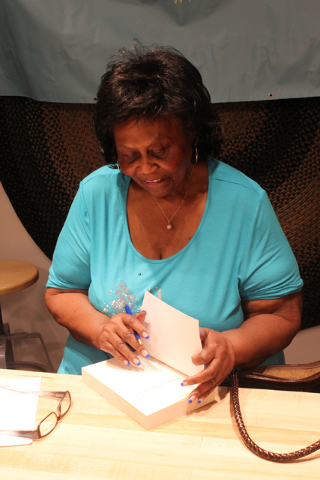Welfare rights advocate tries to get black women involved in politics
Ruby Duncan’s presence compels people to listen — and rightfully so.
She’s the mother of the welfare rights movement in Las Vegas, which is why a crowd is overflowing out of the backroom of The Writer’s Block to hear her speak.
Duncan is one of the panelists for the Politics of Black Women discussion, which talks with local activists about fighting for justice issues from pay equity to health care and the role African Americans play in that fight.
The event was organized by the Nevada chapter of Make It Work, a grassroots campaign working to address injustices such as affordable child care and the minimum wage.
Erika Washington, the Nevada State Director for the organization, says Duncan began a fight many of the current activists are carrying on.
“Ruby laid the foundation for grassroots efforts in Nevada,” Washington says. “We couldn’t do the work we do today without what she did.”
The mother of seven children, Duncan was a pantry worker on the Strip in the ‘60s.
Her life changed when she slipped and fell at work.
“I cracked my back and both my knees,” Duncan says.
She was determined to return to work when she mended, but needed help in the interim. Duncan sought welfare only to be denied.
From there, she started talking to other mothers to learn about their struggles getting welfare. Going door to door, she began to organize a powerful coalition of everyday women who just wanted to have the resources to take care of their families.
Duncan became the president of the Clark County Welfare Rights Organization. Her journey lead her everywhere from the halls of the capitol in Carson City to Las Vegas Boulevard, where she marched arm and arm with other mothers seeking reform for welfare rights.
Her story is documented in the book “Storming Caesars Palace.”
Though Duncan broke through many barriers, there are still many issues facing women — African American women in particular.
Laura Martin, the associate director of the Progressive Leadership Alliance of Nevada, and Asha Jones, U.S. Senator Harry Reid Deputy Director for Southern Nevada, joined Duncan and Washington to talk about grassroots efforts being waged locally to tackle these issues.
Panelists were asked a variety of questions from the audience and addressed some of the pressing issues they feel are affecting black women.
Martin says that wage inequity and reproductive justice top the list of issues women are facing.
Even though there are activists fighting for these issues, there is more to be done.
Each panelist was adamant about one thing: voting.
“If we don’t vote, people make decisions for us,” Washington says.
National statistics — along with Duncan’s testimony — show how powerful African American women are as a voting block.
“We are the most reliable voters,” Martin says. “Yet we are the most disrespected. We aren’t courted (by politicians) the way we should be.”
Martin adds black women and the issues that affect them the most aren’t really talked about during the election cycle.
On top of that, looking at election campaign staffs or political consultants doesn’t often reflect the diversity it should, she says.
Martin says it’s a matter of making their voices heard, part of which means attending school board or council meetings.
There are many battles ahead, but Duncan has faith the next generation of grassroots activists will make an impact and create change.
“These women are going to take it in from here,” Duncan says, referring to the panelists. “They’ve been taking it in.”
Contact reporter Michael Lyle at mlyle@reviewjournal.com or 702-387-5201. Follow @mjlyle on Twitter.



















